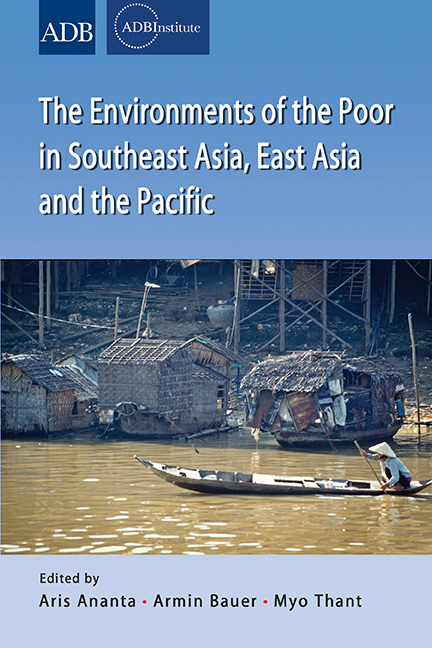Book contents
- Frontmatter
- Contents
- Preface
- List of Contributors
- Part I OVERVIEW
- Part II EAST ASIA (People's Republic of China and Republic of Korea)
- Part III PACIFIC ISLANDS
- Part IV MAINLAND SOUTHEAST ASIA (Cambodia, Thailand, Vietnam)
- Part V ARCHIPELAGIC SOUTHEAST ASIA (Indonesia, Malaysia, Philippines)
- 13 The Political Economy of Environmental Policy in Indonesia
- 14 Prospering in Environmental Degradation: An Illustration from an Upland Area, South Kalimantan, Indonesia
- 15 Making a Living in the Face of Environmental Change: A Case in an Indigenous Community in Sarawak, Malaysia
- 16 The Response of Rural Coastal Households to Typhoon Milenyo in the Philippines
- 17 Life Along Manila's Flooding Rivers
- 18 Quantifying the Health Risks from Pathogens in the Flood Water in Metro Manila
14 - Prospering in Environmental Degradation: An Illustration from an Upland Area, South Kalimantan, Indonesia
from Part V - ARCHIPELAGIC SOUTHEAST ASIA (Indonesia, Malaysia, Philippines)
Published online by Cambridge University Press: 21 October 2015
- Frontmatter
- Contents
- Preface
- List of Contributors
- Part I OVERVIEW
- Part II EAST ASIA (People's Republic of China and Republic of Korea)
- Part III PACIFIC ISLANDS
- Part IV MAINLAND SOUTHEAST ASIA (Cambodia, Thailand, Vietnam)
- Part V ARCHIPELAGIC SOUTHEAST ASIA (Indonesia, Malaysia, Philippines)
- 13 The Political Economy of Environmental Policy in Indonesia
- 14 Prospering in Environmental Degradation: An Illustration from an Upland Area, South Kalimantan, Indonesia
- 15 Making a Living in the Face of Environmental Change: A Case in an Indigenous Community in Sarawak, Malaysia
- 16 The Response of Rural Coastal Households to Typhoon Milenyo in the Philippines
- 17 Life Along Manila's Flooding Rivers
- 18 Quantifying the Health Risks from Pathogens in the Flood Water in Metro Manila
Summary
Poverty reduction and environmental conservation are the twin goals in economic development. However, the two goals can be in conflict. Since the poor are typically engaged in primary production and there fore highly dependent upon natural resources, environmental degradation undermines their means of subsistence much more than that of other people. Therefore, environmental conservation can reduce poverty. But the long-term interests of the poor can be at odds with their short-term interest. Since survival is the most important short-term interest, it is not a trivial conflict for them. The poor have limited choices and control over their future. Improvements in the environment may not even be seen positively, as they do not have better alternatives for income. They resist environment rehabilitation programmes because they often benefit from environmentally harmful livelihoods. This is a classic conflict between the collectively rational and the individually rational behaviour.
In China, farmers, livestock grazers, and forest workers are disadvantaged by the Natural Forest Conservation Programme (NFCP) in the dryland areas of Northern Shaanxi Province (Cao et al. 2010). The programme had successfully banned logging and grazing in the forest, causing the people around the forest to lose their source of income. Cao et al. (2010) also showed that the poorer the people are, the more they suffer from the forest conservation programme. The youngest and oldest, as well as the female, suffered most from the conservation pro gramme. They recommended that the government provide economic assistance to compensate for the loss of income. Salafsky and Wollenberg (2000) made a similar recommendation for people living near areas rich in natural resources, that is, to create alternative employment opportuni ties so that the people do not work in environmentally harmful activities.
An even better option would be to create employment opportunities that depend on the sustainability of the environment. This would make the micro view of the locals compatible with the macro view of the environmentalists.
- Type
- Chapter
- Information
- Publisher: ISEAS–Yusof Ishak InstitutePrint publication year: 2013

